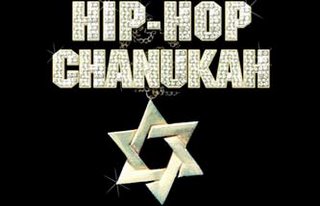Jewish hip-hop artists rap on Torah, Chanukah

NEW YORK (Reuters) - They have baggy clothing, backward baseball caps, the "bling bling" and racy lyrics. And these days, rappers sometimes wear yarmulkes too.
Hip-hop music, which grew out of black inner cities, isn't typically associated with Jews, but as the genre has grown more popular, some Jewish artists have embraced it as their own, while transcending theological and ethnic differences.
New York-based Hip Hop Hoodios, whose name is a play on the Spanish word for Jews, is a Latino-Jewish group that has recorded in English, Spanish and Hebrew. Their lyrics include such sardonic lines as: "My nose is large, and you know I'm in charge."
A popular 26-year-old Hasidic singer, Matisyahu, raps in a brimmed hat and dark suit over reggae beats. "Torah food for my brain let it rain till I drown, Thunder! Let the blessings come down," he says in "King Without a Crown."
The growing genre has also seen artists like Remedy collaborate with mainstream acts like Wu-Tang Clan.
"It's very much a representation of the cooperative state of Jewish and black relations today," said Rabbi Marc Schneier, president of the Foundation for Ethnic Understanding, which is chaired by hip-hop impresario Russell Simmons. "I view cooperation, not conflict, as the defining element."
While some commentators still see rifts between American blacks and Jews, many agree that relations have improved greatly. At the same time, hip-hop has gone mainstream.
Experts said hip-hop can appeal to audiences of diverse backgrounds, including Jews, while still maintaining its authenticity.
"It's impossible to separate this phenomenon from a move by Jews in their late teens to late 30s to explicitly identify themselves as Jews in American popular culture," said Joel Schalit, managing editor of Tikkun magazine, who personally likes two Israeli Hebrew-language artists -- Sagol 59 and HaDag Nahash.
"What might be new is that more artists are emphasizing their Jewishness in their content and marketing."
An example: Chutzpah, comprised of two suburban New York natives and a Los Angeles actor, whose first single from a self-titled CD and accompanying DVD is "Chanukah's Da Bomb."
50 SHEKEL, MESHUGGE KNIGHT
"A lot of people think because 'Chanukah's Da Bomb' is the single, it's for Jewish people," said the group's 44-year-old dreadlocked member, David Scharff. "It's like saying Woody Allen is for Jewish people. It's for everybody."
Formed by music producer Tor Hyams, Chutzpah even enlisted 71-year-old veteran actor George Segal as "Dr. Dreck," its "coordinator."
"The lyrics are quite solid and informative, as well as witty, sharp and funny," Segal said in a phone interview. "That's what makes it work."
Chutzpah treads the line between seriousness and satire. Parody acts in Jewish hip-hop have been common. Among them, 50 Shekel was a takeoff on 50 Cent. M.O.T. was managed by Meshugge Knight, a takeoff on Suge Knight. And 2 Live Jews featured Dr. Dreidle and Ice Berg.
"If you're looking for a tale of 'gangsta' life, Jewish hip-hop might not be the place to start," said Alana Newhouse, arts and culture editor at the Forward newspaper.
"The best Jewish hip-hop artists plumb serious elements of Jewish history, but all are creating a new way to tell the story of Jewish experience."
Beastie Boys are the most commercially successful Jewish rap act, and the only one to achieve mainstream success. But it was only recently that their Jewish backgrounds began to be reflected in their lyrics.
Rabbi Schneier said Jewish hip-hop can resonate with non-Jewish listeners, including many with similar views in other areas.
"Jews view themselves as a minority when it comes to issues of race and changing demographics, and on many questions their responses are identical to those of African-American and Latino respondents," Schneier said. "Hip-hop is a unifying force that resonates with young people."
In the video for "Chanukah's Da Bomb," Chutzpah cruises town in a Volvo with a roof-mounted menorah and raps that Chanukah, "whichever way you spell it," is better than Christmas because it lasts seven days longer.
"Humor (is) one of the only things the Jews had when they were being oppressed for century after century," Hyams said.
"The only difference between us and any other hip-hop group is that they don't say their religions before they say they're a hip-hop group," he continued. "We say it because we're proud of it."
© Copyright Reuters Ltd. All rights reserved. The information contained In this news report may not be published, broadcast or otherwise distributed without the prior written authority of Reuters Ltd.
12/07/2005 08:16
RTR
No comments:
Post a Comment